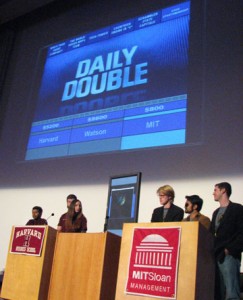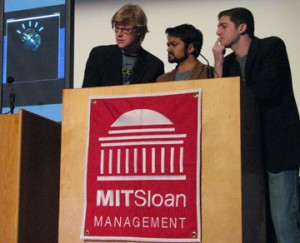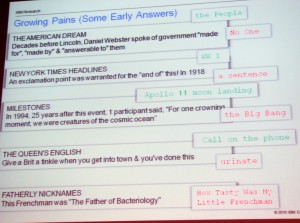The Answer…the Daily Double
-
-
slice.mit.edu
Filed Under
Recommended
The Final Jeopardy Answer: Finding the spot for this memorial caused its creator to say, "Americans will march across that skyline." (Question below)

It’s the age-old question. Who’s smarter, a group of grad students or a supercomputer powered by 2,880 Power processor cores? The two were pitted against each other Monday, when groups from MIT’s Sloan School of Management and Harvard Business School took on IBM Watson, the Jeopardy! supercomputer, in an exhibition game of the popular TV quiz show.
The answer was simple. The supercomputer responded correctly to every question it buzzed in on, en route to “winning” $53,601. Harvard, which featured two students who had previously appeared on Jeopardy!, placed second with $42,399. MIT, which finished with a higher score than Harvard in the practice round earlier in the day, struggled in the first round, came up short in Final Jeopardy, and finished third with $100.
“We did some mild Googling to prepare,” MIT Sloan’s Gautham Iyer MBA ’12 said. “We also took a look at the Jeopardy! board game. But it was tough to focus since two of us just had an exam this morning.”
The game featured categories like “Presidential Rhyme Time” (sample questions: Bush’s tushes and Obama’s llamas) and “Countries that End in ‘E.’” MIT Sloan ended the first round at -$200 but began Double Jeopardy with consecutive answers in “Scrambled State Capitals” and “World Series MVP Teams” to increase their score to $4,500.
Thanks to a true Daily Double that netted $11,200, Harvard took a brief lead during Double Jeopardy. Watson quickly took over, running the table in “11 Letter Words” and taking a lead it would never relinquish.
The exhibition capped a daylong symposium, “The Race Against the Machine: The Future of Technology and Employment,” co-hosted by the two schools and IBM.
David Ferrucci, IBM’s Principal Investigator for Watson Technologies, spoke about the evolution of Watson and its struggles during infancy (see photo below). The symposium also focused on the commercialization of Watson-like technology and the fundamental transformation of the global economy in the future.
“It’s ultimately not about Jeopardy!,” Ferrucci said. “It’s about avoiding biases and looking at all possibilities. It’s not always about the final decision; it’s about finding the correct information that’s needed.”
Watson, named after IBM found Thomas J. Watson, is an IBM-created computer system that can understand meaning and context of human language and has the capability to instantly sift through 200 million pages of data. Harvard and MIT are in good company: the machine soundly defeated Jeopardy! champs Ken Jennings and Brad Rutter in a televised contest earlier this year.
“Clicking the buzzer was a lot tougher than I thought,” Iyer said. “Every time we had the right answer, it felt like we were too late to buzz in.”
The question: What is Mount Rushmore?








